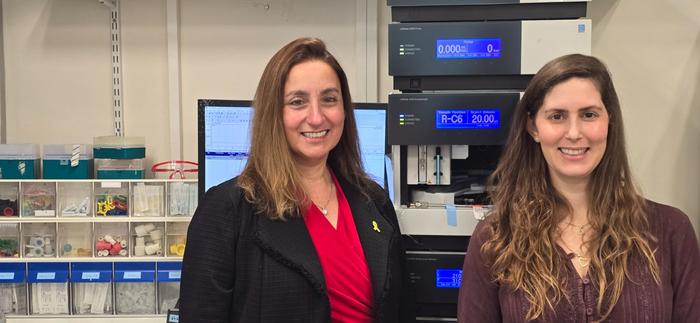Researchers at Tel Aviv University have unveiled a groundbreaking platform designed to revolutionize the delivery of dual drug therapies for cancer treatment. Utilizing polymeric nanoparticles, this innovative system targets specific cancer types, notably skin cancer and breast cancer, significantly enhancing both therapeutic efficacy and safety. The pioneering study was spearheaded by Prof. Ronit Satchi-Fainaro, alongside doctoral student Shani Koshrovski-Michael, and a team of dedicated researchers from the university’s School of Medicine.
This cutting-edge research addresses a significant challenge in oncology: the simultaneous administration of multiple drugs to achieve synergistic effects. Traditionally, cancer treatment involves using a combination of drugs; however, variations in their physical and chemical properties often prevent them from reaching the tumor site together. Different rates of degradation, circulation times in the bloodstream, and the ability to penetrate tumors create a disjointed delivery system that limits the combined impact of the drugs. Prof. Satchi-Fainaro’s team sought to overcome these obstacles by ensuring synchronized and selective delivery of drug pairs directly to cancerous tissues.
The researchers engineered biodegradable polymeric nanoparticles capable of encapsulating two distinct drugs that work synergistically to amplify their therapeutic potential. These nanoparticles are uniquely designed to degrade into harmless components—water and carbon dioxide—within a month, thereby minimizing any long-term effects on the body. By attaching sulfate groups to these nanoparticles, they are directed to P-selectin, a protein that is prevalent on the surface of cancer cells and the newly formed blood vessels that nourish tumors. This targeting strategy allows for enhanced accumulation of therapeutic agents specifically at the tumor site while sparing healthy tissues from unnecessary exposure.
Two specific drug pairings were incorporated into this nanoparticle platform, both of which have received FDA approval for clinical use. The first pair consists of BRAF and MEK inhibitors, which are utilized in treating melanoma that harbors BRAF gene mutations—a mutation found in approximately fifty percent of melanoma cases. The second pairing involves PARP and PD-L1 inhibitors, which are aimed at treating breast cancer characterized by BRCA gene mutations or deficiencies. Testing of this novel drug delivery system was conducted in two settings: advanced three-dimensional cancer cell models in laboratory conditions and animal models representing both primary tumor forms and their metastatic brain lesions.
The study’s findings were promising and paved the way for significant advancements in cancer treatment strategies. The targeted nanoparticles demonstrated a high rate of accumulation within primary tumors, effectively bypassing healthy tissues. Particularly impressive was their ability to penetrate the blood-brain barrier, delivering therapeutic agents precisely to metastases in the brain while protecting surrounding healthy brain tissue from harm.
Moreover, when the dual-drug therapy was administered using the nanoparticle system, its effectiveness far surpassed traditional methods. Remarkably, even when using doses that were 30 times lower than those typically required in preclinical studies, the nanoparticles evoked a far more robust response. This potent approach to drug delivery led to a marked reduction in tumor sizes and significantly prolonged periods before disease progression, extending survival rates in treated mice. The researchers observed that mice receiving treatment through the nanoparticle platform had median survival rates twice that of those subjected to free drug administration, and three times longer than those in the untreated control group.
Prof. Satchi-Fainaro emphasized the versatility of this sophisticated platform, noting its potential to transport various combinations of drug pairs, further enhancing treatment for numerous cancer types. The platform is particularly relevant for cancers that express the P-selectin protein, including glioblastoma, pancreatic ductal adenocarcinoma, and renal cell carcinoma. This flexibility allows for individualized treatment approaches that could cater to the unique profiles of different patients and the specific characteristics of their tumors.
Innovative research of this magnitude requires significant investment and support. This project was made possible through competitive research grants from prestigious organizations, including Fundación “La Caixa,” the Melanoma Research Alliance (MRA), the Israel Science Foundation, and the Israel Cancer Research Fund. Additionally, it aligns with broader research initiatives within Prof. Satchi-Fainaro’s laboratory, backed by an Advanced Grant from the European Research Council. Such funding underscores the importance of continued investment in research that may lead to breakthroughs in cancer treatment.
The implications of this research are vast, stretching beyond existing drug combinations and offering insights into the potential for developing new therapeutic regimens. As scientists and medical practitioners strive to create increasingly effective cancer therapies, platforms like this signal a promising future in the fight against one of humanity’s deadliest diseases. By leveraging advanced materials and innovative delivery systems, researchers are forging a path toward treatments that are not only more effective but also safer for patients.
In conclusion, the collaborative efforts of the researchers at Tel Aviv University mark a significant advancement in the field of cancer therapy. The development of a dual drug delivery platform utilizing biodegradable polymeric nanoparticles showcases the potential for enhancing treatment outcomes in primary tumors and metastases. With the capability to deliver drug pairs effectively and selectively, this innovative approach could represent a turning point in how cancer is treated, offering hope to countless patients around the globe.
Subject of Research: Dual drug delivery for cancer treatment using polymeric nanoparticles.
Article Title: Innovative Drug Delivery Platform Marks New Era in Cancer Treatment.
News Publication Date: October 2023.
Web References:
References:
- DOI: 10.1126/sciadv.adr4762
Image Credits: Credit: Tel Aviv University.
Keywords: Cancer treatment, polymeric nanoparticles, dual drug delivery, melanoma, breast cancer, biodegradable materials, targeted therapy, nanoparticle technology, P-selectin, drug efficacy, translational research.




